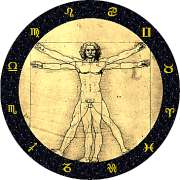Weboteric - Astrology
|
 |

Astrology - Mercury
Fleet Messenger of the Gods
Closest to the Sun, Mercury (as Hermes) has been the fleet messenger of the gods, bringing luck to the mortals he meets.
The symbol illustrates receptivity (the crescent) resulting from the exaltation of spirit (the circle) over matter (the cross).
Mythology
In Roman mythology Mercury is the god of commerce, travel and thievery. The Roman counterpart of the Greek god Hermes, the messenger of the Gods.
The planet probably received this name because it moves so quickly across the sky.
Mercury is also associated with magic and trickery.
Mercury has been known since at least the time of the Sumerians (3rd millennium BC). It was given two names by the Greeks: Apollo for its apparition as a morning star and Hermes as an evening star. Greek astronomers knew, however, that the two names referred to the same body.
Another symbol of Mercury is the winged caudecus (matching Mercury's wings) with entwined snakes of knowledge and a sphere of wisdom.
Effects of Mercury
Astrologically Mercury is seen as THE MIND, the giver of wisdom and our progression from the purely instinctive realm of the animal kingdom by the use of the INTELLECT.
It is ideas, methods, information, progressing through experimentation and invention. The transmitter of the spiritual to the material. . Mercury associates with children before puberty and through this connects with tricks and jokes, youthfulness and light-heartedness. It rules all forms of communication, for example telephone calls, letters, speech. This planet is mobile and intellectual; it rules the sciences, curiosity, manner of thought and travel. It is also associated with merchants, commerce and mental pursuits. Wheeling and dealing would fall under Mercury's rule as would lying and cheating.
It represents the power of communication (even the Internet), interpretation and self-expression, intelligence and reason. Its action is to quicken and enliven whilst adding mobility and fluidity. The symbol illustrates receptivity resulting from the exaltation of spirit over matter.
How Mercury will manifest its energy, the indicator of your intellectual and inventive abilities, depends on the horoscope as a whole. The Sign (and its Element), the House in which if falls, and the Aspects to the other planets will all have a bearing on any interpretation.
The House Mercury is in shows the particular area in which our mental talents are put to practical use. This is the area in which we realise our need to make contact and increase our learning.
It is connected with contacts to siblings, friends and people at school. Mercury represents our thoughts and the constant activity that goes on in our heads. It is connected to the nervous system and physical co-ordination.
The Sign Mercury lies in shows how we communicate and the psychological areas in which our mental talents lie. Mercury is the fastest of all planets and cleaves to the Sun, either being in the same Sign as the Sun or one of the Signs on either side of the Sun.
Aspects to Mercury show mental talents and communication styles in a very specific way. They indicate our individual interests and abilities
Mercury Key Facts |
|
Rules: |
|
Detriment: |
|
Exhalt: |
|
Fall: |
|
Colours: |
Blues and violets |
Stones & Metals: |
Marble, aquamarine, glass and mercury |
Keywords: |
Communication and travel |
Astronomy
Mercury is the planet nearest the sun, its dayside temperature hits 430°C but its nightside temperature falls to -180°C which is amazing considering how near to the sun it is.
Mercury is in many ways similar to the Moon: its surface is heavily cratered and very old. On the other hand, Mercury is much more dense than the Moon being the second most dense major body in the solar system, after Earth.
Daylength (rotation) |
58.7 Days |
Year length |
88 Days |
Distance from the sun (average) |
36 million miles (58 Million KM) |
Distance from Earth (shortest) |
57 million miles (92 Million KM) |
Distance from Earth (greatest) |
136 million miles (219 Million KM) |
Size (Earth=1) |
0.38 |
Mass (Earth=1) |
0.06 |
No of moons |
None |


Copyright © Weboteric.com 2006 Webdesign by WebOneUK